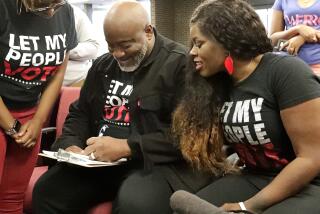A vote for D.C.
- Share via
Since taking office, President Obama has expressed an unusual interest in the District of Columbia -- sometimes a critical interest, as when he ragged Washingtonians about their oversensitivity to winter weather. Obama’s engagement with his new home has raised hopes that he will press early and hard to allow district residents a voting representative in Congress.
Obama, however, has indicated that the issue of voting rights for the district is on his back burner. Last month, he told the Washington Post that he continues to support the idea, but ominously added: “I think our legislative agenda’s chock-full.” No one expects Obama or Congress to defer action on revitalizing the economy, but prompt enactment of district voting rights wouldn’t require much legislative heavy lifting.
Last year, the House passed a bill that would have expanded its membership to 437, allowing a seat for D.C. and another for Utah, which almost gained an additional representative in the last census. Utah’s extra seat would be temporary; like those of other states, its representation would be reconfigured by the 2010 census. The House bill, which stalled in the Senate, has been reintroduced in the current Congress as the District of Columbia House Voting Rights Act of 2009.
The provision for an additional seat for Utah, a reliably red state, is designed to balance the creation of a seat for the solidly blue district. This is obviously partisan horse-trading. But worse compromises have been forged to further an important goal. Allowing district residents to discard those “Taxation Without Representation” license plates is such a goal. It’s unconscionable that residents in the nation’s capital, who weren’t given the right to vote for president until 1961, have only a nonvoting delegate in the House, the “people’s chamber” whose constituents are individuals, not states.
Some district residents hope the drive for voting rights won’t stop with House representation. They dream, probably unrealistically, of the day the district will be transmuted into the state of “New Columbia,” with its own two senators. But that clearly would require a constitutional amendment, whereas some legal scholars say that representation in the House can be accomplished by statute. They cite Article I, Section 8, of the Constitution, which says that Congress is “to exercise exclusive legislation in all cases whatsoever” involving the national capital.
Opponents of the legislation say this provision is trumped by other language in Article I, which says that House members will be “chosen every second year by the people of the several states.” Ultimately, a court would have to decide which of two constitutional provisions should prevail. Obama’s preferred interpretation seems obvious. The question is not whether the president will support voting rights for his new neighbors, but when. The answer should be: soon.
More to Read
Sign up for Essential California
The most important California stories and recommendations in your inbox every morning.
You may occasionally receive promotional content from the Los Angeles Times.













